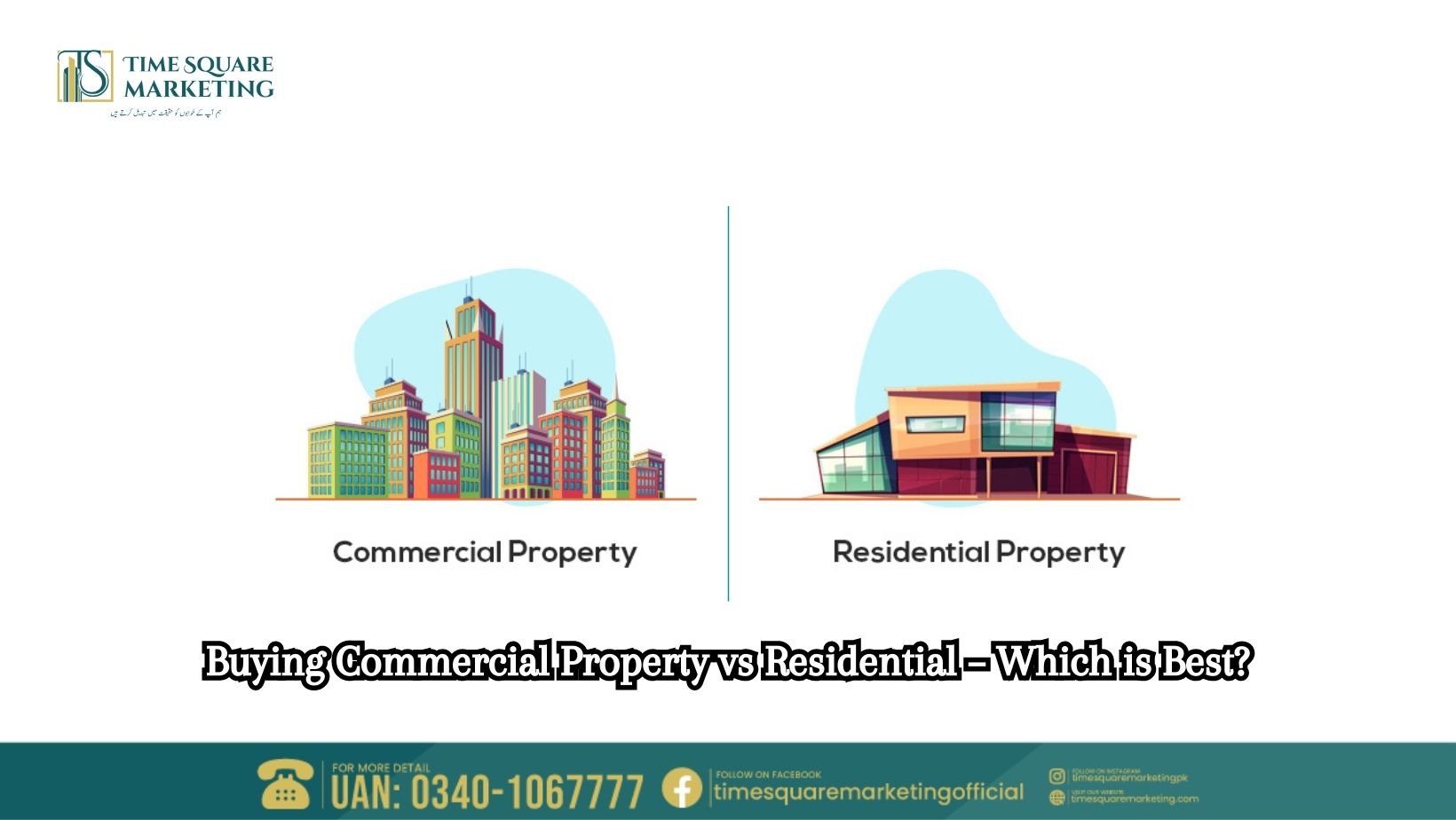When it comes to investing in real estate, one of the crucial decisions you’ll have to make is whether to buy commercial property or residential properties. Each option comes with its unique advantages and disadvantages, and it’s essential to understand them thoroughly before making a choice. In this article, we’ll explore the key factors to consider when deciding between buying commercial property vs. residential properties. From potential returns and market trends to managing risks, we’ll provide valuable insights to guide your decision-making process.
See Also: Blue World City Islamabad | Payment Plan 2023
Buying Commercial Property vs Residential
To begin our journey of exploring the better investment option between commercial and residential properties, let’s delve into the specifics of each. Understanding the fundamentals will set the stage for a more informed comparison.
Commercial Property: A Gateway to Prosperity
Commercial properties refer to real estate assets primarily used for business purposes, such as office spaces, retail establishments, industrial facilities, and warehouses. Investing in commercial property offers unique opportunities, and it’s essential to weigh the pros and cons carefully.
See Also: Blue World Trade Center | Payment Plan 2023
Potential for Higher Returns
Commercial properties generally offer higher rental yields compared to residential properties, making them an attractive option for investors seeking better returns on their investments.
Longer Lease Durations
Lease agreements for commercial properties are typically longer, providing stability and predictable income streams for investors. This factor can be appealing for those seeking a steady source of passive income.
Diversification and Multiple Tenants
Commercial properties often have multiple tenants, reducing the risk associated with vacancy. Diversification also minimizes the impact of any single tenant’s financial struggles on the overall investment.
Higher Entry Barriers
Investing in commercial properties usually requires a more substantial initial capital investment, making it less accessible for some individual investors.
See Also: 94 Business Center | Location | Payment Plan 2023
Market Sensitivity
The performance of commercial properties is closely tied to economic conditions, making them more sensitive to market fluctuations.
Residential Properties: A Place to Call Home and Invest
On the other side of the spectrum, residential properties are those used for dwelling purposes, such as single-family homes, condominiums, apartments, and townhouses. Let’s explore the features that make residential properties an appealing investment option.
Steady Demand
Residential properties benefit from a constant demand for housing, as people always need a place to live. This inherent demand can provide a sense of stability to your investment.
Lower Entry Barriers
Compared to commercial properties, residential real estate is generally more affordable, allowing for a broader range of investors to enter the market.
Emotional Appeal
For some investors, the emotional connection of owning a residential property and providing housing for others can be deeply rewarding.
Appreciation Potential
Residential properties can appreciate in value over time, building equity for the owner.
Residential Financing Benefits
Financing options for residential properties are often more favorable and accessible compared to commercial properties.
Factors to Consider When Choosing Between Commercial and Residential Properties
1. Investment Goals and Objectives
Identify your investment goals and objectives before deciding between commercial and residential properties. Are you seeking long-term capital appreciation, stable rental income, or a mix of both?
2. Risk Tolerance
Understand your risk tolerance level. Commercial properties may offer higher returns but also come with increased risks.
3. Market Trends and Demand
Analyze the current market trends and demand in the specific area you are interested in. Determine whether there’s a higher demand for commercial spaces or residential units.
4. Location
The location of the property is crucial for both commercial and residential investments. Consider factors like accessibility, nearby amenities, and potential for future development.
5. Maintenance and Management
Commercial properties often require more intensive maintenance and management, while residential properties might be less demanding in this regard.
6. Tax Implications
Understand the tax implications of each investment type. Commercial and residential properties may have different tax structures and benefits.
7. Financing Options
Evaluate the financing options available for both commercial and residential properties, and choose the one that aligns best with your financial capacity.
8. Economic Factors
Keep an eye on economic indicators that could affect your investment, such as interest rates, inflation, and job market trends.
Conclusion
In conclusion, the choice between buying commercial property vs. residential properties depends on your individual circumstances, investment goals, and risk tolerance. Commercial properties may offer higher returns, longer lease durations, and diversification benefits. On the other hand, residential properties can provide steady demand, emotional appeal, and lower entry barriers. To make an informed decision, carefully consider the factors outlined in this article, and seek professional advice if needed. Remember, a well-thought-out investment strategy is key to success in the real estate market.
FAQs
What Are Some Tax Advantages of Investing in Commercial Property?
Investing in commercial property can offer tax advantages such as depreciation deductions, property tax deductions, and deductibility of mortgage interest.
Are Residential Properties Less Volatile Than Commercial Properties During Economic Downturns?
Yes, residential properties tend to be less volatile during economic downturns, as housing is considered a basic necessity, ensuring a relatively stable demand.
Can I Invest in Both Commercial and Residential Properties?
Yes, diversifying your real estate portfolio by investing in both commercial and residential properties can help spread risk and provide a balance of steady income and potential high returns.
Which Type of Property Is Easier to Finance for a First-Time Investor?
Residential properties generally offer more accessible financing options for first-time investors due to lower down payment requirements and less stringent lending criteria.
What Are the Key Considerations When Choosing a Commercial Property?
When choosing a commercial property, factors like location, accessibility, target market, lease terms, and property condition are crucial to consider.
Is It Better to Invest in Established or Up-and-Coming Areas?
Both options have their merits. Established areas may offer stability, while up-and-coming areas can provide higher growth potential. It depends on your risk appetite and investment strategy.




















